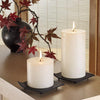Take a minute to notice how your body feels. Specifically, notice what feels uncomfortable, what doesn’t feel quite right. Any tense muscles? A sniffly nose? Maybe something you ate isn’t sitting quite right, or maybe you have chronic pain. There’s something.
There are lots of ways of practicing with the body, and many of them have to do with actual activity: how we walk, how we bow, how we hold ourselves when we sit in meditation. My understanding is that Zen, at least, is fundamentally a physical practice. How we carry our body, how we carry objects, how we move in the world—it all matters. From a practice perspective, it is at the heart of the matter.
But right now, instead of looking at how we move, I want to look at how we feel. So, how do you feel? For almost everyone, the answer is that “a little off.” Right now, for example, I’d say I feel fine: I have some energy, no serious aches and pains, my stomach is okay from lunch. But my neck is always kind of tight, and my shin itches (wool socks?), and just typing “itches” seemed to make my ear itch for a second, and I have a hangnail on my thumb that stings a little.
It’s always like this. The question is, what do I do about it? I like to frame spiritual practice in terms of maturity, but what is maturity? Often, what we mean by maturity is a measure of how someone relates to discomfort, of how someone does or doesn’t work from a place of acceptance. When my kids were toddlers, they couldn’t handle discomfort at all—tantrums and despair would arise from “My sock doesn’t feel right!” Now that they’re older, it’s becoming more subtle, but they still shut down when they’re hungry, for example, or when a disappointment comes too fast or too hard.
Wherever we are in our life, we have some idea of a baseline, a comfort zone, and when we are taken out of it, we feel the need to react, to put things right. When my ear itched a minute ago, I reached up and scratched it. That may seem like the most natural thing in the world, but it merits some interrogation. An itchy ear isn’t so bad—why do I automatically try to fix it? What if I don’t scratch it? Instead, what if I observe it, notice it?

We see this in meditation all the time. We’re told, generally, to basically stay still and to remain present to our experience. So, an itch—what then? It seems that one of two things will happen if we don’t scratch it, and both are worthy of our attention. The first is that it might consume us—this little insignificant itch might start to take up all of our focus, so that it’s all we see. That can happen with any thought, but in the case of an itch, where we could so easily address it, it can feel like a battle is raging inside our heads. The second possibility is that it changes, all by itself. It might completely go away; an itch doesn’t need to last. But even if it doesn’t, if we choose not to scratch it, if we just let it be, our discomfort may naturally fade in intensity (even if the itch itself does not).
I don’t want to say that we should seek out discomfort or that we should suffer on purpose. But I do think we should pause before we scratch that ear. In that urge to scratch, to make things “right,” we find the entire foundation of the Buddhist path. The first of the Buddha’s four noble truths is that all life is characterized by dukkha—I would usually translate dukkha as dissatisfaction, but discomfort works just as well. We always experience some kind of discomfort. Always. The second truth is that there is a reason for discomfort. An itch is just an itch; without our judgment of it, it’s neutral. But we believe in that baseline, in the idea that the itch should be fixed, and that’s what makes it uncomfortable. The third truth simply states, then, that the way to move beyond discomfort is to let go of our idea of the baseline. And the fourth lays out a map for that, a path of practices that seem, on the surface at least, to be kind of uncomfortable.
Why all this talk about a stupid itch? Who cares?
There are a couple reasons. One is that we so often position this practice and these teachings in our heads. We imagine that engaging with Buddhism feels deep and leads to all kinds of profound thoughts. It can. But nothing about this practice requires you to spend time in your head like that, or to perceive the world in any particular way. Instead, we just notice things as they are, notice ourselves as we are, and notice the apparent tension between the two. If you want to go deep, that’s a starting place, but it’s also a whole path.
The second reason is that learning to make space around discomfort, to not just react, is a skill, one we can cultivate with intention. If you can resist that itch for a few seconds or a minute or forever, if you can let go of that baseline, then you can start to be less reactive to other kinds of discomfort: emotional discomfort, psychological discomfort, spiritual discomfort, social discomfort. Being still and not scratching your ear is such a small thing, but it is being still. Whatever we want to do, whether it’s building better relationships or fighting injustice, we have to learn how to pause, how to move with intention, sometimes how to not move, period. If you can’t resist scratching your ear, how can you stand your ground?

Author: Koun Franz
Koun Franz is a Montana-born Soto Zen priest who trained, taught, and translated in traditional monasteries in Japan. He is the guiding teacher of Thousand Harbours Zen in Halifax, Nova Scotia; his talks can be found on the their podcast.
The Botanical Zafu Zabuton Set is part of our newest meditation cushion collection, where traditional zafu and zabuton designs are made with contemporary fabrics. A beautiful addition to your home, meditation center, or yoga studio space!
Revive your senses and spirit with our all-natural aromatherapy home & body mist. Spray on your body, hair, around your home, on linens and even in the shower before you jump in. Consciously handcrafted with Organic Aloe and Witch Hazel.
Hand-poured unscented candles with subtly frosted surface are ideal for offerings of light on your home altar. Made in Thailand.
There is no better way to customize your comfort! Perfect for meditators and yogis who need more support while in meditative or yoga positions. Whether you need added height, or extra cushioning — our variety of support cushions will provide additional comfort and flexibility.






1 comment
I hope that everyone who reads that takes the time to read it until the end.
Thank you for sharing.